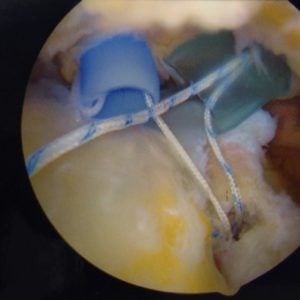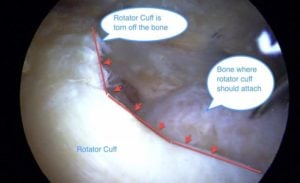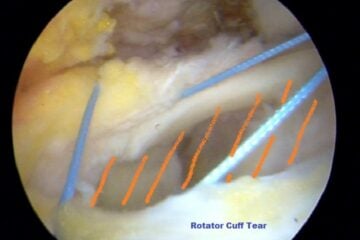
Rotator cuff tears are a common cause of disability and shoulder pain. While many rotator cuff tears do not require surgery, some tears will. One of the most common side effects of rotator cuff and shoulder surgery is stiffness. Stiffness after rotator cuff surgery is fairly common. Another significant potential problem after rotator cuff surgery is failure of the repaired rotator cuff to heal. New research in this area reveals an interesting correlation between post operative stiffness and healing of the rotator cuff. In our latest video discussions we cover the topic of stiffness after shoulder surgery in a little more depth.
Stiffness after rotator cuff surgery

Many people with a painful shoulder also have shoulder stiffness. Stiffness of the shoulder could be due to inflammation around the shoulder which can cause the tissues to be thickened and less flexible. Stiffness because of a rotator cuff tear can also be due to weakness or pain from moving trying to move a torn muscle. The brain likely plays a significant role in stiffness as well. Neuroinhibition, where the signals from the brain to the painful muscles is inhibited will likely prove to be a key player in causing stiffness around the shoulder.
Stiffness is a common problem after rotator cuff surgery.
In some patients there is a genetic predisposition to developing stiffness after rotator cuff surgery. That means thats any surgery around your joints can set off a pre-programmed (DNA) series of events which leads to your tendons and ligaments becoming thicker and less flexible. Some patients become very stiff after surgery, and others have a more mild course of stiffness which resolves rapidly. Interestingly, in many patients no stiffness develops after rotator cuff surgery. Sadly, it is nearly impossible to predict who will become more stiff after surgery. The size of your tear has no correlation to whether or not you will develop stiffness. Some patients with small tears become very stiff and others with large tears have no stiffness.
Is shoulder stiffness protective?

How are stiffness and healing after a rotator cuff repair related
McNamara and his colleagues in Australia recently published a series of 1500 patients. McNamara found that there was a significantly higher rate of healing in patients who developed stiffness after a rotator cuff repair. Those patients who became stiff slowly regained their motion over the course of 24 weeks. The authors state that the higher healing rate is due to a more exuberant healing response… but that remains to be studied. We know that inflammation is the body’s way of healing itself, so perhaps there is some truth to this. Perhaps the inflammation which has led to stiffness also led to a stronger healing response.
Do you have questions regarding an Orthopedic injury or longevity?
Do you want to talk to an expert who can listen to you for 45-60 minutes and explain the options in detail?
Dr. Howard Luks offers remote guidance sessions to review your X-ray or MRI images and explain your options.
Dr. Luks has also received hundreds of requests for educational sessions on the topics discussed in his book, Longevity Simplified.












